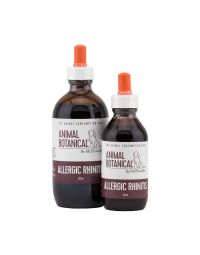Just like people, some animals - particularly dogs and cats - are prone to seasonal allergies, marked by sneezing, nasal discharge, or general respiratory discomfort. These signs are often linked to a condition known as Allergic Rhinitis, which is an inflammatory response of the nasal passages triggered by allergens.
This condition typically arises from exposure to environmental substances such as pollen, mould spores, dust mites, household sprays, perfumes, cleaning chemicals, or even certain foods. While seasonal changes can worsen symptoms, for sensitive animals the reaction may occur year-round depending on their triggers and environment.
What happens in Allergic Rhinitis?
Allergic Rhinitis occurs when an animal's immune system misidentifies harmless substances as threats. This hypersensitive response activates immune cells that release histamines, leading to inflammation of the nasal passages and symptoms like:
- Sneezing
- Runny nose or watery discharge
- Coughing or reverse sneezing
- Nasal congestion
- Itchy eyes or nose
- General respiratory irritation
Unlike infections, these symptoms are not caused by viruses or bacteria but by an overactive immune system. While antihistamines may suppress the symptoms temporarily, they do not address the underlying issue - the body’s exaggerated immune response.
McDowells’ herbal approach to Allergic Rhinitis
At McDowells Herbal, we focus on rebalancing the immune system rather than simply masking symptoms. Our approach involves nourishing and settling the respiratory immune system, supporting the body to recalibrate its responses to environmental triggers over time.
We do not aim to desensitise animals to specific allergens - which can be inconsistent and vary from season to season - but rather to build systemic resilience, reduce the overreaction, and restore balance through herbal support.
Holistic Considerations
Allergic Rhinitis is often connected with a broader pattern of immune hypersensitivity. It may occur alongside or lead to other symptoms such as:
- Itchy skin (atopy)
- Digestive discomfort
- Ear inflammation
- Generalised inflammation or reactivity
In many cases, this points to an underlying imbalance in the gut-immune axis. Addressing digestive health alongside respiratory immunity can lead to better long-term outcomes.
Dietary irritants, environmental chemicals, and chronic stress can further weaken the immune barrier, leaving animals more prone to allergic flares. By supporting elimination pathways - especially the liver, bowels, and lymphatic system - we help reduce the overall toxic burden and inflammation.
McDowells Herbal Allergic Rhinitis Support Mix
Our custom-blended Allergic Rhinitis Support Mix is designed to support animals with hay fever-like symptoms through a combination of immune-modulating, anti-inflammatory, and respiratory-toning herbs. This formula helps calm excessive immune reactivity and supports the tissues of the respiratory tract.
Key herbal ingredients:
Chamomile – Calms the nervous system and soothes inflamed mucous membranes
Euphorbia – Traditionally used to support healthy nasal and sinus passages
Fenugreek – Acts as a gentle expectorant and mucosal cleanser
Horseradish – A pungent root that helps clear nasal congestion and sinus inflammation
Vervain – Strengthens nervous and immune system regulation, especially in sensitive individuals
Alfalfa – Rich in natural vitamins and minerals to support immunity and vitality
This combination is gentle yet effective, supporting both acute flare-ups and long-term rebalancing of the immune response.
Supportive measures
In addition to herbal tonics, the following can help reduce the burden on the respiratory immune system:
- Provide a clean, dust-free environment, avoiding chemical sprays or strong odours
- Consider air purifiers during high pollen seasons
- Feed a natural, whole food diet appropriate to your animal’s species
- Support gut health with prebiotics and gut-soothing herbs (e.g., slippery elm, chamomile)
- Ensure regular brushing and bathing with natural shampoos to reduce surface allergens
A gentle, natural way forward
Allergic Rhinitis doesn't need to be managed solely with suppressive treatments. By looking at the root cause of immune hypersensitivity, we can support the body in finding its natural balance again - gently and holistically.
If your dog or cat shows signs of recurring nasal allergies, reach out to our McDowells practitioners for personalised support. We offer free consultations and custom herbal programs tailored to your animal’s unique constitution and needs.
Start with a free initial consult today to explore how herbs can help your companion breathe easier and feel better.

